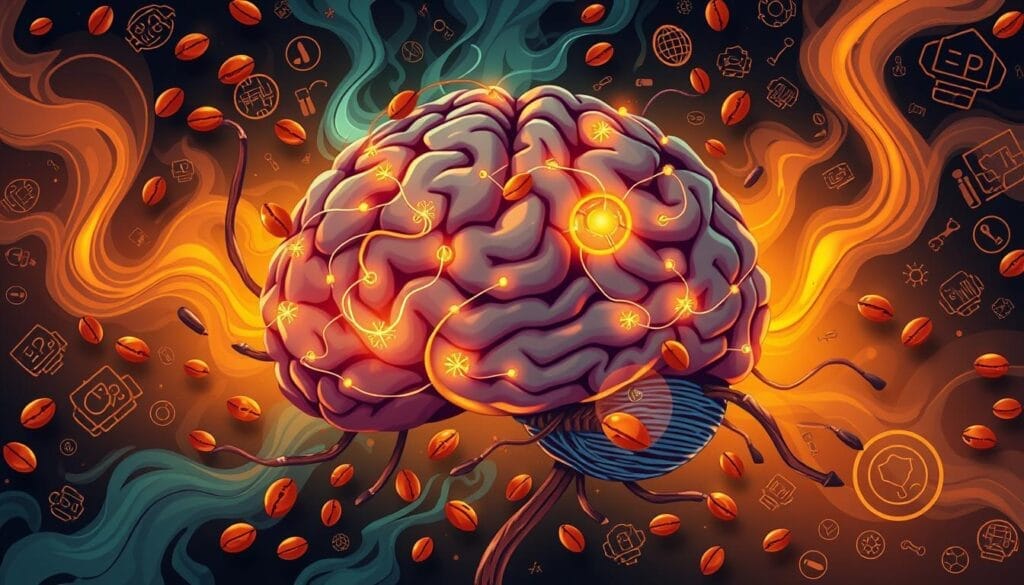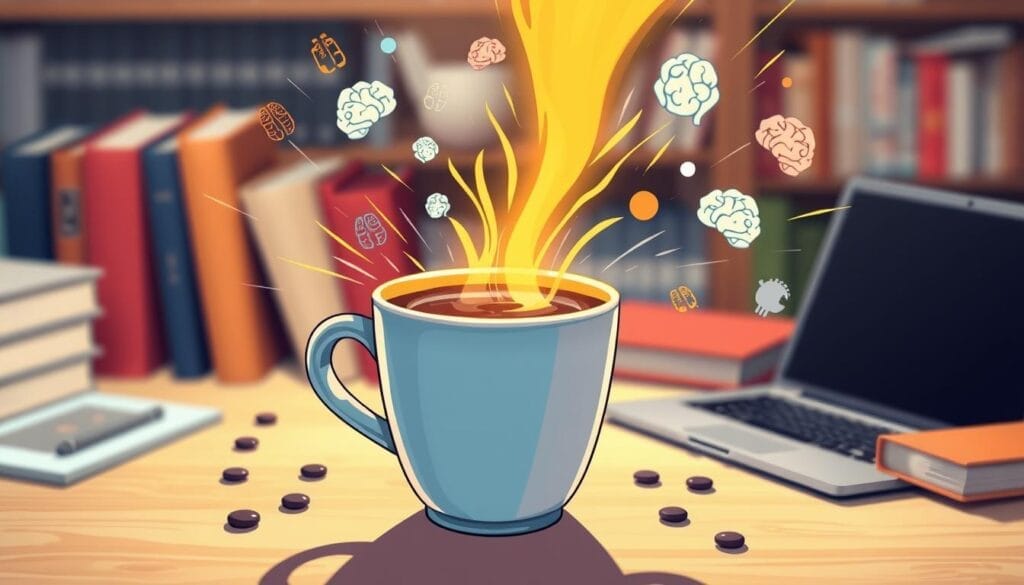Have you ever grabbed a cup of coffee before a big exam or an important meeting, hoping it will sharpen your mind? You’re not alone. Millions rely on caffeine daily to kick-start their mental performance. But what exactly is the impact of caffeine on memory and focus?
Caffeine is the most popular stimulant worldwide. The impact of caffeine on memory and focus is great. A study at Johns Hopkins University found that caffeine can boost long-term memory.
Participants who took 200-milligram caffeine tablets after studying images could better tell them apart from similar ones the next day. This study, led by Michael Yassa, showed that caffeine makes memories stronger. It also helps keep them from being forgotten, especially in tasks that need hard discrimination or pattern separation.
As more people use caffeine daily, knowing impact of caffeine on memory and focus is key for better brain function.
In this blog, we will explore the impact of caffeine on memory and focus, how caffeine influences memory, attention, and overall brain performance, and we’ll help you understand how to use it wisely.
Table of Contents
ToggleWhat is Caffeine and How Does It Work in the Brain?
Caffeine is a stimulant found in many plants like coffee and tea. It’s used by most adults in the U.S. and is the most popular stimulant worldwide. People drink over 200 mg of caffeine every day on average.
Historical Use of Caffeine
Caffeine has been used for thousands of years. It helps people stay alert and think better. Even a little caffeine can make you feel more awake and focused.
Every day, 1.6 billion cups of coffee are drunk around the world. Caffeine is very popular. But too much can cause problems like anxiety and trouble sleeping. It’s key to use caffeine wisely to enjoy its benefits without harm.
The Science of Stimulation
Caffeine is a stimulant many people drink. To understand the impact of caffeine on memory and focus, you need to know how it plays with adenosine.
- Caffeine blocks adenosine, a chemical that makes you feel tired.
- When adenosine is blocked, alertness and wakefulness increase. This increases energy use and lowers blood flow to the brain.
- Caffeine also increases neurotransmitters like dopamine and norepinephrine, which help with mental clarity and alertness.
So instead of feeling sleepy, your brain stays awake and ready to focus.
This is why caffeine helps us stay awake and sharp. It’s especially helpful when we’re feeling tired, like in the morning.
Bioavailability and Half-Life in the Human Body
Caffeine acts fast, but how long it lasts depends on your body.
- It usually kicks in within 30–60 minutes after consumption.
- The effects can last 3 to 5 hours, depending on your metabolism.
- Factors like age, liver health, and medications can change how fast your body breaks it down.
| Factor | Influence on Caffeine |
|---|---|
| Body weight | Heavier bodies may need more to feel effects |
| Metabolism | Faster metabolism = shorter caffeine half-life |
| Medications | Can slow down caffeine processing |
Release of Neurotransmitters
- Caffeine makes animals move more, showing it boosts cognitive performance enhancement.
- It helps with learning, memory, and staying focused by keeping us alert.
- Even though we don’t get used to it, caffeine can still cause withdrawal.

The impact of caffeine on memory and focus is complex. It involves how it changes neurotransmitters and brain areas. Knowing how it works helps us understand its effects on our minds.
Caffeine and Short-Term Memory
Studies on caffeine and short-term memory have given mixed results. But, a study with college students found caffeine in the morning boosts memory. The best dose for this is about 200 mg, as seen in a Johns Hopkins study.
This effect was strongest in the early morning. Caffeine didn’t help as much with other types of memory or in the afternoon. This shows caffeine works best at certain times and with specific memory tasks.
Studies on Caffeine and Recall
A study on caffeine and memory had 21 participants, mostly African American undergrads. They drank caffeinated or decaf tea before doing memory tests and math. Those who had caffeinated tea in the morning did better in memory tasks.
But, there were no big impact of caffeine on memory and focus.
Optimal Doses for Memory Enhancement
Research has shown caffeine helps with thinking, from 32 mg to 300 mg. The Johns Hopkins study used 200 mg, which seems to be the best for memory. People who usually drink more than 250 mg of caffeine were not in the study.
Knowing how cimpact of caffeine on memory and focus can help us use memory retention supplements and study productivity hacks. This can help us do better in school and work.
Short-Term Memory Enhancement
Research shows caffeine can improve memory in the short term. Here’s how:
- A 200 mg dose improves memory retention and recall.
- People do better on memory tasks 30 minutes after consuming caffeine.
- Caffeine helps you store information better when taken after learning.
So, yes, caffeine may make your brain remember things more clearly right after consumption.
The Relationship Between Caffeine and Attention
Caffeine is famous for helping you focus. But how sharp is that edge really?
Increased Alertness and Reaction Time
People often feel more focused after consuming caffeine and science backs this.
- Studies in military and night-shift workers show caffeine improves reaction time.
- Caffeine helps people perform better on tasks that require attention.
- Caffeine and brain function are closely tied through better signal transmission.
Caffeine makes your brain work faster and with more energy—especially when you’re tired.
Limitations: Jitters, Overstimulation & Focus Fatigue
But there’s a downside too. More is not always better.
- High doses can cause jitters, nervousness, and irritability.
- Too much caffeine leads to focus fatigue and distraction.
- A 2010 review found that while moderate caffeine improves attention, high doses make you more likely to be distracted.

Potential Negative Effects of Caffeine on Cognitive Function
Too much caffeine brain effects can hurt your brain. Drinking too much caffeine can make you feel anxious and jittery. It can also mess up your sleep.
Anxiety and Overstimulation
Too much caffeine can make you feel anxious and uncomfortable. The FDA says healthy adults should not have more than 400 mg of caffeine a day. That’s about 4-5 cups of coffee.
Sleep Disruption
Caffeine can mess up your sleep, even a little bit. Drinking just one cup of coffee can make it harder to fall asleep. A study showed that 300 mg of caffeine can make it take longer to fall asleep.
This can make it hard to remember things and focus. It’s important to get enough sleep to keep your brain working well.
Caffeine Consumption Patterns Among Different Populations
Caffeine is a popular [nootropic stimulant]. It’s part of daily life for many. College students often use it to stay awake during early classes and long study times. They see it as a way to boost their study productivity.
Daily Intake Among Students
About 90% of people worldwide drink caffeine. In the U.S., 80% of adults have it every day. The average U.S. person drinks around 200 milligrams of caffeine daily. This is like drinking a strong coffee or two smaller ones.
College students drink a lot of caffeine. They use it to stay alert and focused while studying.
Usage in Professional Settings
Caffeine is also popular in work settings. People in jobs like healthcare, law enforcement, and the military use it. They drink it to stay alert and productive, especially during long hours or night shifts.
This shows how caffeine helps people in different jobs. It’s a tool for improving focus and work performance.

Research on caffeine’s benefits is growing. It’s important to understand how different groups use it. By looking at how people drink caffeine, we learn more about its impact on work, study, and life.
Caffeine’s Impact on Long-Term Memory
Research shows caffeine might greatly affect long-term memory.
Long-Term Memory Implications
While caffeine may help you remember things short term, the long-term impact of caffeine on memory and focus can be mixed.
- A 2014 Johns Hopkins study found 200 mg of caffeine enhanced memory consolidation, helping the brain lock in information after learning.
- However, too much caffeine can hurt sleep. Poor sleep = bad memory consolidation.
- Overconsumption can disrupt memory formation over time due to poor sleep and stress.
Read → Relationship Between Caffeine and Sleep Quality
Alternatives to Caffeine for Enhancing Memory
Caffeine is popular for boosting brain power, but there are natural ways to improve memory and focus too. Ginkgo biloba and bacopa monnieri are herbal supplements that might help. Also, changing your lifestyle can make a big difference. This includes exercising regularly, getting enough sleep, and reducing stress with meditation.
Herbal Supplements
Herbal supplements like ginkgo biloba and bacopa monnieri might help with memory and focus. Ginkgo biloba could improve blood flow to the brain, helping with thinking. Bacopa monnieri is used in Ayurvedic medicine to boost memory and concentration. But, we need more studies to know how they compare to caffeine.
Lifestyle Changes
- Regular exercise releases endorphins that combat fatigue and improve mood, ultimately enhancing cognitive function.
- Proper sleep hygiene, aiming for 7-9 hours per night, is crucial for optimal memory and concentration.
- Stress reduction techniques, such as meditation, can help mitigate the negative impacts of anxiety and overstimulation on cognitive abilities.
While caffeine might give a quick memory and focus boost, these alternatives offer lasting benefits. By using herbal supplements and making lifestyle changes, you can improve your brain health for the long term.

Optimal Dosage: How Much Caffeine Improves Focus Without Side Effects?
Knowing your sweet spot can help you get the benefits without the crashes.
Sweet Spot for Mental Performance
For most adults, the ideal amount of caffeine for focus is:
- Between 100 and 200 mg per dose.
- Caffeine works best when spaced out through the day.
- The optimal caffeine dosage for focus varies by weight and caffeine sensitivity.
Overconsumption Risks
Too much of a good thing is still too much.
- Over 400 mg per day may cause dependency and disrupt sleep.
- High intake can affect heart rate and raise blood pressure.
- The FDA recommends keeping daily caffeine under 400 mg for healthy adults.
Overuse can damage long-term focus and create caffeine tolerance, where your body needs more to feel the same effect.
| Dosage | Effect on Focus | Notes |
| 100 mg | Mild boost | Good for beginners |
| 200 mg | Stronger boost | Ideal for most adults |
| 400+ mg | Anxiety, poor sleep | Risk of side effects of caffeine on cognitive performance |
Individual Differences: Why Caffeine Doesn’t Affect Everyone the Same?
Ever wonder why your friend can chug coffee and still sleep like a baby, but you can’t?
Genetic Factors (CYP1A2 enzyme, ADORA2A gene)
Genetics play a big role in how caffeine affects your brain.
- People with the CYP1A2 gene break down caffeine faster.
- Those with the ADORA2A gene variant are more sensitive to anxiety from caffeine.
- Your genes affect how well caffeine improves or worsens focus.
Age, Sleep Quality, and Hormonal Influences
Other factors also change how caffeine works for you.
- Older adults metabolize caffeine slower.
- Poor sleep and caffeine interaction can lower focus, especially in teens.
- Hormones during menstruation and pregnancy also affect caffeine’s impact
The Role of Caffeine in Academic Performance
Caffeine’s effect on school work is complex. It can make you feel more alert and focused. This is good for studying and exams. But, how it changes your grades is not clear.
Studies show that a little caffeine can help you do better in school. But too much or at the wrong time can mess up your sleep. This can ruin any good effects caffeine might have.
Caffeine Consumption and Grades
About 92% of college students drink coffee often. Drinking a little caffeine, up to 400 milligrams a day, can help you do better in school. It makes you more alert and focused.
This can help you remember things better when studying. And you might do better on tests.
Study Habits and Caffeine Use
- Caffeine in doses of 200 to 250 mg can make you feel better. These effects can last up to 3 hours. This can make studying more productive.
- But, too much caffeine (600 mg) can make you feel more tense or anxious. This can mess up your studying and focus.
- When you drink caffeine is important. Drinking it too close to bedtime can mess up your sleep. This can ruin any good effects it might have.
The impact of caffeine on school work is not simple. A little, at the right time, can help. But too much or at the wrong time can hurt your sleep and focus. How you react to caffeine and your study habits are key to its effect on your grades.
How to Use Caffeine Smartly for Memory and Focus
Use caffeine with strategy, not just habit.
Caffeine Timing Strategies
- Best used in the morning or early afternoon.
- Avoid caffeine after 3 PM to prevent sleep problems.
- Don’t use caffeine on an empty stomach.
Spacing caffeine throughout the day avoids brain fog and helps with steady focus.
Stacking Caffeine with Other Nootropics
Stacking means combining caffeine with other safe substances to improve results.
- L-theanine (from green tea) calms the nervous system while caffeine excites it.
- This combo gives a focused, calm energy without the jitters.
- Common nootropics like rhodiola and bacopa also work well with caffeine.
Who Should Limit or Avoid Caffeine?
Caffeine isn’t for everyone. Some should be careful.
Individuals with Anxiety, Insomnia, Heart Issues
- Caffeine worsens anxiety symptoms and can trigger panic attacks.
- People with heart problems should avoid high doses.
- Caffeine can make insomnia worse and disturb sleep cycles.
Teens, Pregnant Women, and Seniors
- Teens have more sensitivity to caffeine and can experience poor focus.
- Pregnant women should limit caffeine to under 200 mg/day.
- Older adults may process caffeine slower and should avoid late consumption.
What Dr. Chandril Chugh Recommends for Smart Caffeine Use
As a trained neurologist, I often get questions from patients about caffeine. My advice is simple: Use it wisely.
- Understand your personal limits.
- Don’t depend on caffeine to mask poor sleep or bad habits.
- Combine caffeine with a healthy lifestyle, proper sleep, and mental discipline.
If you’re struggling with memory consolidation, poor focus, or brain fog, don’t guess, get professional help. Book a consultation with me, Dr. Chandril Chugh, and let’s find out what’s really going on.
FAQ
What is the impact of caffeine on memory and focus?
Caffeine is a stimulant found in many drinks. It affects the brain, improving memory and focus. Studies show it can make memories stronger and last longer.
It also boosts alertness and helps with tasks when you’re tired.
How does caffeine affect the brain?
Caffeine works by blocking certain brain receptors. This makes the brain more active. It releases chemicals that make us feel awake and alert.
What are the effects of caffeine on short-term memory?
Research on caffeine and short-term memory is mixed. But one study found that morning coffee boosts memory. The best dose is about 200 mg.
How does caffeine impact attention and task performance?
Caffeine helps with staying focused and doing tasks better. It’s especially helpful when you’re tired. It makes you more alert and quick to react.
What’s better: Coffee or energy drinks?
Coffee is usually better due to natural antioxidants and no added sugar. Energy drinks and caffeine supplements often contain additives. Book a dietary review with Dr. Chugh to find the best fit for you.
What are the long-term effects of caffeine on memory?
Caffeine might help with long-term memory. A study found that 200 mg after learning helped remember things better. It’s especially good for tasks that need pattern recognition.
Are there alternatives to caffeine for enhancing memory and focus?
Yes, there are other ways to boost memory and focus. Herbal supplements like ginkgo biloba and bacopa monnieri can help. Exercise, good sleep, and meditation also improve brain function.
How does caffeine affect academic performance?
Caffeine’s impact on schoolwork is mixed. It can help with morning exams but its overall effect is unclear. Too much or at the wrong time can hurt sleep and performance.
About The Author

Medically reviewed by Dr. Chandril Chugh, MD, DM (Neurology)
Dr. Chandril Chugh is a U.S.-trained, board-certified neurologist with expertise in diagnosing and managing neurological disorders, including migraines, epilepsy, Parkinson’s disease, and movement disorders. His clinical focus includes evidence-based neurological care and patient education.
All content is reviewed for medical accuracy and aligned with current neurological guidelines.




